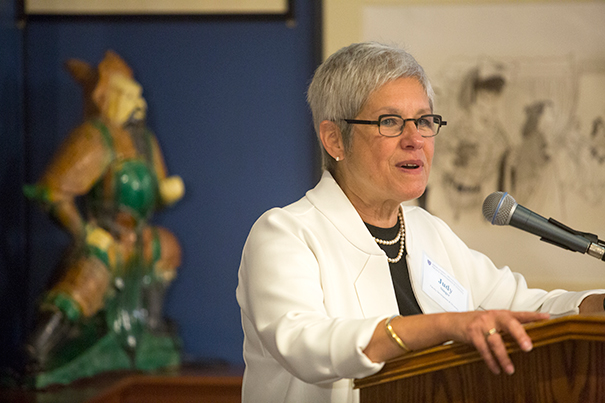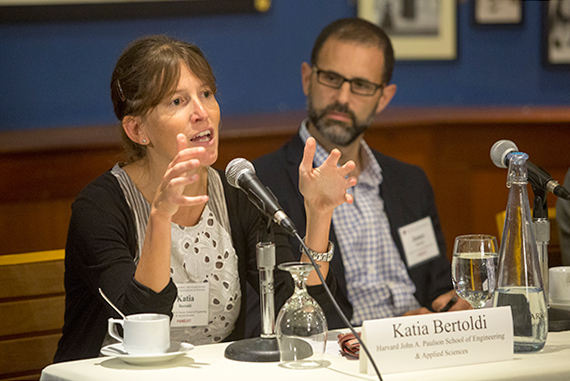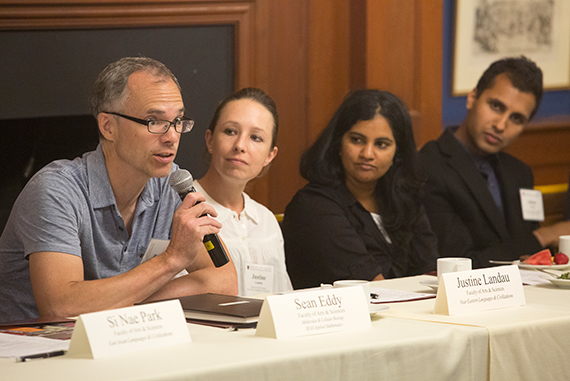
“One commitment I had when I first started was to make faculty at Harvard feel not just a part of their department or School, but of Harvard University,” said Senior Vice Provost for Faculty Development and Diversity Judith D. Singer (photo 1) in addressing the group (photo 2). Provost Alan M. Garber (photo 3) urged new faculty to immerse themselves not just in their departments, but in the University at large.
Jon Chase/Harvard Staff Photographer
New faculty plant roots
Session welcomes them, advises on settling in
How many committees are too many? How does a researchers garner grants in a time of reduced federal funding? How do you juggle family life with academic life?
These were a few of the questions on the minds of newly arrived faculty who attended the New Faculty Institute earlier this month. Sponsored by the Office of Faculty Development and Diversity, the event included remarks from Provost Alan M. Garber and Senior Vice Provost for Faculty Development and Diversity Judith D. Singer, in addition to tenure-track and tenured faculty panels.
Part welcome exercise, part information session, part networking opportunity, the faculty forum was designed to make the 64 assistant professors, four associate professors, and 41 professors new to campus feel at home.
“One commitment I had when I first started was to make faculty at Harvard feel not just a part of their department or School, but of Harvard University,” Singer told the group. “Harvard is a fabulous place with lots of interesting people, and lots of rich opportunities.”
That spectrum of opportunity is what makes Harvard special, Garber told the group, urging them to immerse themselves not just in their departments, but in the University at large.
“We have many treasures, many things that make Harvard look like a spectacular place,” he said. “But what I think is genuinely distinctive of Harvard, and why it’s so great to be a faculty member or student here, is that our excellence extends across so many areas.”
With expertise in fields ranging from cosmology to East Asian languages to Middle Eastern politics, Harvard’s newest hires are both intellectually and individually diverse. Of the 68 tenure-track faculty to join Harvard this year, 40 percent are female, while 28 percent are underrepresented minorities.
“This is not the same Harvard I experienced when I first arrived,” Singer said.

New faculty had the opportunity to hear from colleagues about life at Harvard, how to develop as an academic, and how to foster relationships that lead to collaborations.
Katia Bertoldi, a natural sciences associate professor at the Harvard John A. Paulson School of Engineering and Applied Sciences, said daily lunches with colleagues enabled her to ask questions she might not have felt comfortable raising in a more formal setting. She also recommended being choosy about taking advantage of travel and conference opportunities.
“You really can spend all your time traveling and going to conferences and giving talks,” she said. “Life is a compromise; be selective.”
With federal research funding on the decline, many new faculty expressed concerns about how to ensure their work is funded.
“Develop a strength,” advised James Mitchell, an associate professor in genetics at the Harvard Chan School. “It’s easier to publish and get grants for things people know you’re really, really good at.”
Between writing grants, serving on committees, teaching, and caring for families, there’s one skill that veteran faculty recommended their new colleagues develop.
“When someone asks me to take something on, I ask myself, ‘Is this something I would consider doing next week?’ If not, I say no,” said Devah Pager, a sociology and public policy professor at the Faculty of Arts and Sciences, Harvard Kennedy School, and the Radcliffe Institute for Advanced Study. “It’s hard to choose among the many things we might want to do, but we can’t do them all, and we shouldn’t get caught in the trap of accepting invitations just because they’re extended so far in advance.”

Over the past several years, Singer’s office has worked closely with deans and faculty to recruit more diverse candidates to Harvard, and implement policies and tools to improve faculty life. Clock stops enable tenure-track faculty to take time to have children, while a University geomap helps them find colleagues who live in their neighborhoods and have shared interests. Singer’s office recently developed a guide for departments to help eliminate bias from the recruitment and interview process, and has worked with Schools to institute formal mentorship programs for junior faculty.
The efforts aren’t lost on those recently arrived to Harvard. In his few weeks on campus, Sean Eddy, a professor of molecular and cellular biology and applied mathematics, said he is already struck by “how much everyone cares about meeting other people.” Eddy, who develops computational algorithms and software tools for genome sequence analysis, noted this was very different from his previous post at a research institute.
“I came from an environment where everyone had a narrow focus, so it’s great to be in a place where I meet new colleagues in ‘book fields.’ It’s a new culture for me. I feel like a whole world has opened.”
Tamarra James-Todd, an assistant professor of environmental reproductive and perinatal epidemiology at the Harvard Chan School, said excitement for her new post is twofold.
“First of all, I’m looking forward to interacting with thought leaders in public health,” she said. “But I’m also enthusiastic about the opportunity to both teach and learn from the next generation of scholars. I know they will spark new ways of thinking in me.”




